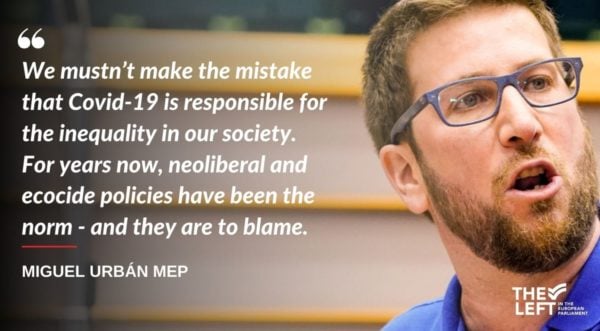As Europe grapples with the Covid-19 pandemic, authorities have brought in significant restrictions and lockdown measures. But all emergency powers exercised by member states should guarantee the protection of fundamental rights, rule of law and democracy. However, some states have taken advantage of this crisis to push through restrictions on basic rights.
Here are five ways in which Covid-19 measures have hit civil liberties:
- Sexual and reproductive health and rights
During the pandemic, member states should have ensured that women and girls were guaranteed safe and timely access to sexual and reproductive health rights, especially access to contraception and abortion care.
Unfortunately, many are struggling to access abortion safely due to highly restrictive laws in several member states and administrative requirements for such access. As signalled by Amnesty International, governments need to act urgently to guarantee timely access to abortion care during the pandemic.
This comes in the context of the draconian abortion laws proposed by the Polish government recently, which have provoked massive street protests. The current laws on abortion are highly restrictive and disproportionately affect women living in poverty, disability or from other vulnerable groups.
- LGBTI+ rights
The emergency powers adopted by different governments should not be used as an excuse to repress LGBTI+ rights. However, the Hungarian government has used the Covid-19 pandemic as a pretext to grab unlimited power and even passed a law to make it impossible for transgender or intersex people to change their gender legally.
EU member states should ensure that despite lockdown measures, vulnerable LGBTI+ groups receive social and institutional support. Due to lockdown measures, there has been a spike in reports of violence and abuse against vulnerable groups, and the anti-LGBTI+ and transphobic rhetoric promoted by right-wing governments have exacerbated these violent acts.
Although extreme measures are necessary for protecting citizens during #COVID19 pandemic, @MalinBjork_EU says the chronic state of emergency is no excuse for "clamping down on fundamental rights such as #WomensRights, trans rights & press freedom in Europe".
"It's a scandal." pic.twitter.com/pUf3QZ2Ei1
— The Left in the European Parliament (@Left_EU) November 12, 2020
- Conditions for migrants
During the pandemic, refugees and asylum seekers have faced poor sanitary conditions, high-risk environments, and vulnerability in camps. The recent tragedy caused by the fires in the Moria camp in Greece exposed the dire living conditions of many migrants. While the Commission has launched measures for health checks, it does not prevent poor sanitary conditions and the huge potential for Covid-19 outbreaks.
Consequently, the Commission and the member states should implement a serious and effective plan to address the situation in the camps, including access to safe and fair asylum procedures. Relocation is crucial.
- The right to privacy and data protection
Privacy must be respected when authorities develop contact tracing apps and other tech tools to combat the pandemic.
The voluntary nature and purpose limitation of contact tracing apps must be guaranteed. Moreover, different authorities and civil society organisations should pay close attention to the deployment of other technological tools such as the use of drones, surveillance of physical distancing, temperature screening, and passenger locator forms.
We need the Commission and the European Fundamental Rights Agency to closely monitor member states deploying technologies that may infringe privacy and personal data protection for citizens.

- The right to information and freedom of expression
Disinformation related to the pandemic has spread far and wide, particularly on social media. The Commission has issued a communication to emphasise the crucial role played by freedom of expression and a pluralistic democratic debate when fighting disinformation.
The best way to fight disinformation is to ensure the right to information and freedom of expression, providing support to ensure media pluralism and independent journalism, as well as protections for whistleblowers. Member states should ensure that they promote enhanced transparency, rebut disinformation, and protect vulnerable groups, such as migrants, that are the target of fake news.
